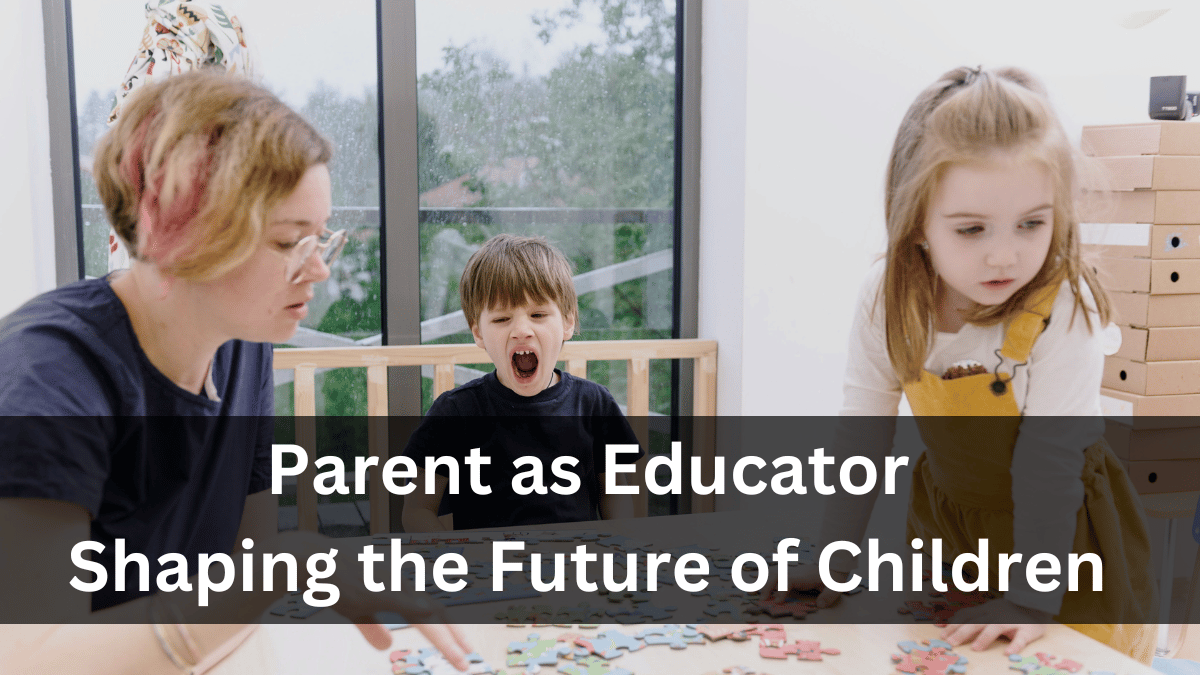Introduction:
While discussing parenting; parent as an educator is an intricate and fulfilling journey laden with diverse responsibilities. Among these, the pivotal role of a parent as an educator stands out, transcending the boundaries of conventional education to encompass the holistic development of a child.
The Crucial Role of Parents as Educators:
From the moment of birth, children embark on a journey of learning, with parents serving as their primary educators. Beyond imparting academic knowledge, parents play a multifaceted role, instilling crucial life skills, values, manners, and more. In essence, they lay the foundation for a child’s emotional, social, and cognitive growth.
Emotional Development:
Parents play a pivotal role in nurturing the emotional development of their children. By teaching them to identify and express feelings, manage emotions, and develop empathy, parents create a secure and supportive environment. This foundation enables children to navigate their emotions effectively, fostering emotional intelligence.
Social Development and parent as educator:
Integral to a child’s growth, social skills are instilled by parents who teach the art of interaction, sharing, respect for boundaries, and conflict resolution. These skills are not only fundamental in the present but serve as building blocks for cultivating healthy relationships in the future.
Cognitive Development:
Parents actively stimulate a child’s cognitive growth through diverse activities and interactions. Concepts such as numbers, letters, colors, and shapes are introduced while encouraging curiosity and exploration. This approach not only imparts knowledge but also fosters critical thinking and problem-solving skills crucial for a child’s intellectual development.
Related: 11520 Education: Revolutionizing Learning and Teaching
The Impact of Parental Education:
Research consistently indicates that children with actively involved parents achieve superior academic outcomes. Beyond academics, they demonstrate heightened self-esteem, improved social skills, and a stronger sense of responsibility. Parental engagement goes beyond formal education, fostering a love for learning, encouraging curiosity, and promoting exploration.
Academic Success:
Children with involved parents tend to excel academically, boasting higher grades, test scores, and graduation rates. Moreover, this involvement lays the groundwork for a child’s motivation to pursue higher education, setting the stage for a lifelong commitment to learning.
Self-esteem and Confidence:
Active parental interest in a child’s education plays a pivotal role in boosting self-esteem and confidence. When children feel valued and important in their learning journey, it positively impacts their overall self-worth, influencing how they approach challenges and opportunities.
Social Skills:
Parental involvement enhances a child’s social skills, promoting effective communication, teamwork, and respect for diverse perspectives. These skills are not only crucial in academic settings but also contribute significantly to a child’s ability to navigate social dynamics in various contexts.
Tips for Effective Parental Education parent as educator:
Create a Learning Environment:
Transform your home into a hub of learning, encouraging reading, discussions, and creative activities. Provide resources that not only stimulate academic learning but also inspire curiosity and creativity.
Be a Role Model parent as an educator:
Children learn through imitation. Demonstrate the behavior and values you wish to instill in your child. Emphasize the importance of continuous self-improvement, showcasing that learning is a lifelong journey.
Encourage Curiosity:
Foster an environment where questions are not only welcomed but celebrated. Nurture your child’s curiosity by encouraging exploration and discovery. Provide opportunities for hands-on learning experiences.
Related: BOOKS ABOUT EDUCATION REFORM
Provide Constructive Feedback:
Celebrate your child’s efforts and offer constructive criticism to promote growth and learning. Create a positive feedback loop that encourages resilience and a healthy approach to success and failure.
Stay Involved parent as educator:
Engage actively in your child’s academic life. Attend parent-teacher meetings, assist with homework, and show genuine interest in their extracurricular and school activities. This involvement reinforces the importance of education in your child’s life.
Conclusion:
In conclusion, parents as educators wield significant influence in shaping their child’s future as educators. The multifaceted role they play encompasses not only academic guidance but also emotional, social, and cognitive development. Embracing this role ensures that children grow into well-rounded individuals, equipped to navigate the challenges of the future with resilience, curiosity, and a lifelong love for learning.








